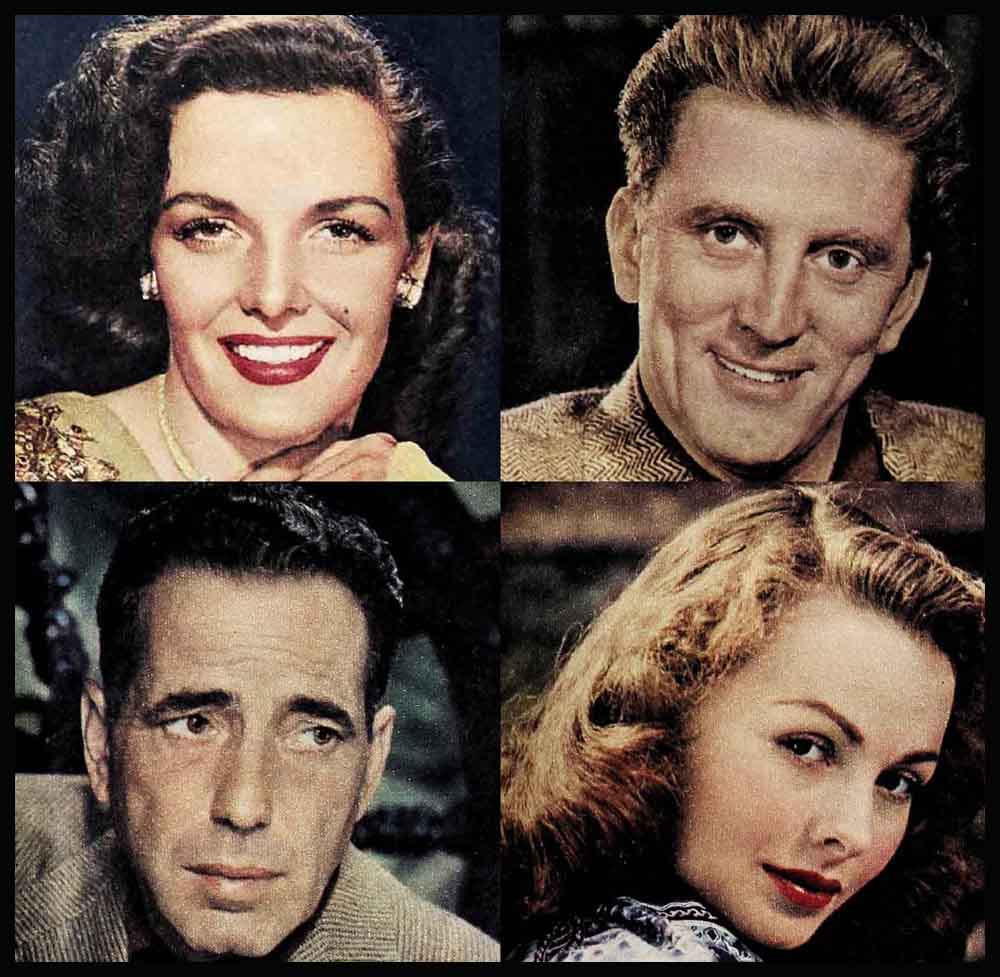
These Enchanted People
Some people seem to be sublimely at home in this world. Whatever happens—whether it is a general event or something that affects them individually—they have the happy faculty of making it pay off to their advantage. Instead of serving life, as most do, they make life serve them. They seem to know, sometimes at the most incredibly early age, exactly what they want. And they go after whatever it may be with such confidence and direction that, of course, they get it.
In Hollywood June Allyson is one of these enchanted. Lucky, we call such people sometimes. But their good fortune, being more consistent than luck ever is, must be assumed to spring from certain qualities which they possess.
June is married to Dick Powell, one of the richest men in Hollywood. She has her new little son and her adopted daughter, Pamela. And her career is riding high.
June was no great shakes when she started in show business. The first night she was in a chorus line on Broadway she was so inept that she danced forward instead of backward—to find herself alone upstage and outside of the curtain. This, however, did not throw her into a tizzy. Grinning at her audience she continued dancing until she maneuvered herself off stage, sweet applause ringing in her ears. June’s like that. She lets people in on her mistakes as well as her dreams. So they go along with her. Not that June is all sweetness and light. She wouldn’t be where she is if she were. She’s stubborn. And beneath her little-girl smile and pout is man-sized grit and determination.

However, she controls herself, never makes the mistake of delivering ultimatums, having tantrums or defying people. If something happens on the set that she doesn’t like she walks, very softly, to her dressing room. And there she stays—until she gets her way.
A few years ago, Metro wanted June to play the role in “Green Dolphin Street” that Donna Reed finally played. June shook her head. This was Lana Turner’s picture and she knew it. So the Metro bosses called a big meeting and described for June the dramatic scene she would play. They told her how she would climb up the side of the cliff with her bare hands in order to escape the tide and how, finally, she would come out in the convent.
“And what,” June asked, “will Lana be doing all that time?” Then she grinned like a little pixie and left them—feeling rather foolish, I should think.
She may look and act little girlie but June has more know-how than many who appear far more worldly and sophisticated—Greer Garson, for instance.
Greer is insecure. The die of her insecurity was cast when, an only child, she grew up among older people. Unaccustomed to children, she was self-conscious when she was with them and felt a need to show off; to hang by her heels, to tell tall tales. They didn’t like her. And so Greer acquired a lack of confidence in her ability to get on with people that still plagues her. Her nervousness at parties, for instance, causes her to talk too much. Sometimes, to cover her insecurity she adopts a manner of condescending graciousness. And she never will make an appearance until she feels that she looks her very best—even if she keeps people waiting an hour or more.
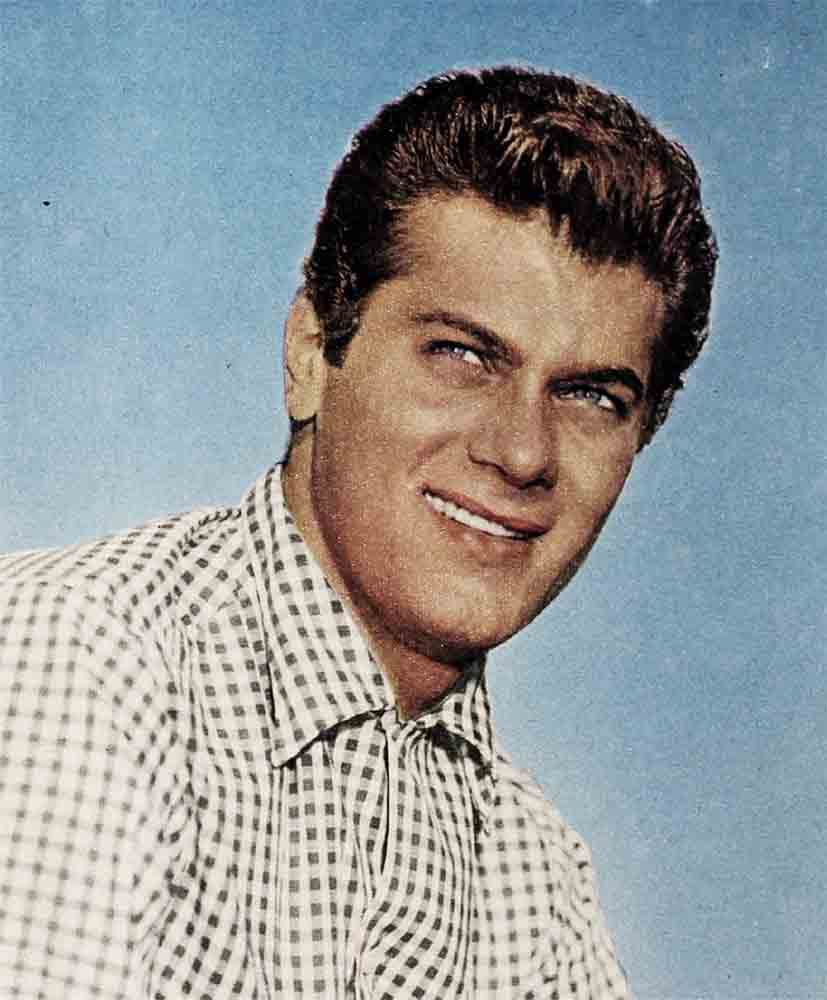
She is far, far from being as much at ease as June. And so, of course, her way is far, far less enchanted.
Perhaps Greer’s marriage to Buddy Fogelson, a healthy, out-giving male, will help her. She adores him. With him, true to her instinctive femininity, she’s completely a wife. Recently, when she and Buddy went to Chicago by train, he suggested lunch in the diner, Greer, who tells this story on herself, demurred. “I’ve never eaten in a public dining car . . .” It was, Buddy said, high time she did. So she did. And had a wonderful time.
Tony Curtis is like June Allyson. He isn’t afraid to let the world in on his dreams and ambitions and he doesn’t hide his vulnerability. Most young people who come to Hollywood pretend a little. Not Tony. He was, he tells you, Bernie Schwartz of the Bronx. And one day, when he was playing in the street in front of his father’s tailor shop, a long black limousine drove by slowly because the street was so narrow and crowded. Recognizing the beautiful woman in the back seat, Tony ran after the car and, pounding on the window, demanded Joan Crawford’s autograph. She gave it to him so graciously, he adored her more than ever.
When Joan heard this story recently she asked Tony to visit in her dressing room. During most of the visit he was tongue-tied. He still has no social graces, no flair. But he soon will have.
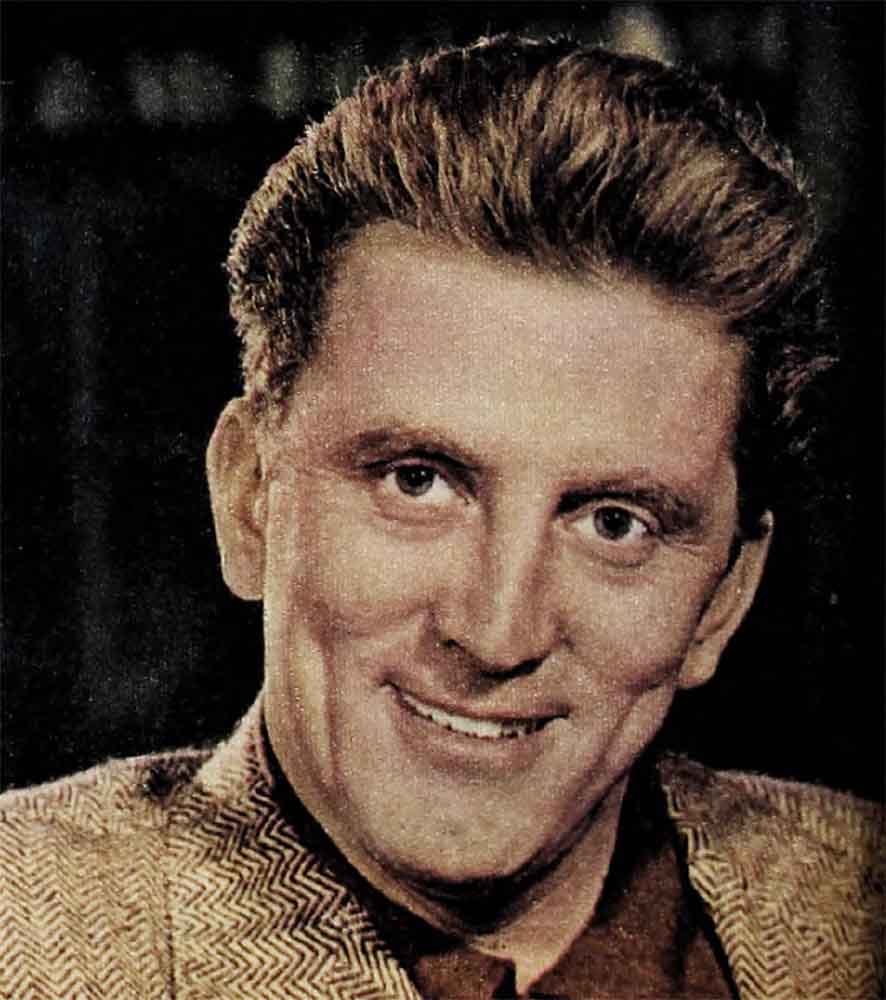
For in Tony’s life now there is Janet Leigh. What could be more wonderful? For Janet is beautiful and happy enough to warm the cockles of any man’s heart. And, young as she is, she’s been around enough to have acquired the very knowledge for which Tony now hungers. She knows this and, loving him, is prepared to take him by the hand figuratively as well as literally.
You could say it was Tony’s luck that brought Janet into his life. But think about it and you’ll know, as I do, that it was his warmth and his willingness to expose his inadequacies that charmed her—as these qualities have charmed others in the past and will again in the future.
You do not have to be a Hollywood star with fame and such fortune as is left after taxes to be one of the enchanted. They exist the world over.
Kirk Douglas had a special gift for life even when he was very young and bitterly poor. And it was because his sisters, older than he, knew this that they pooled their earnings to send Kirk to college.
Some people will tell you that Kirk has gotten cocky and egotistical. Which is nonsense. He was always cocky and egotistical. Otherwise no one would ever have heard of him. You don’t get what you want unless you believe in your rights to it and dedicate your energies to reaching for it.
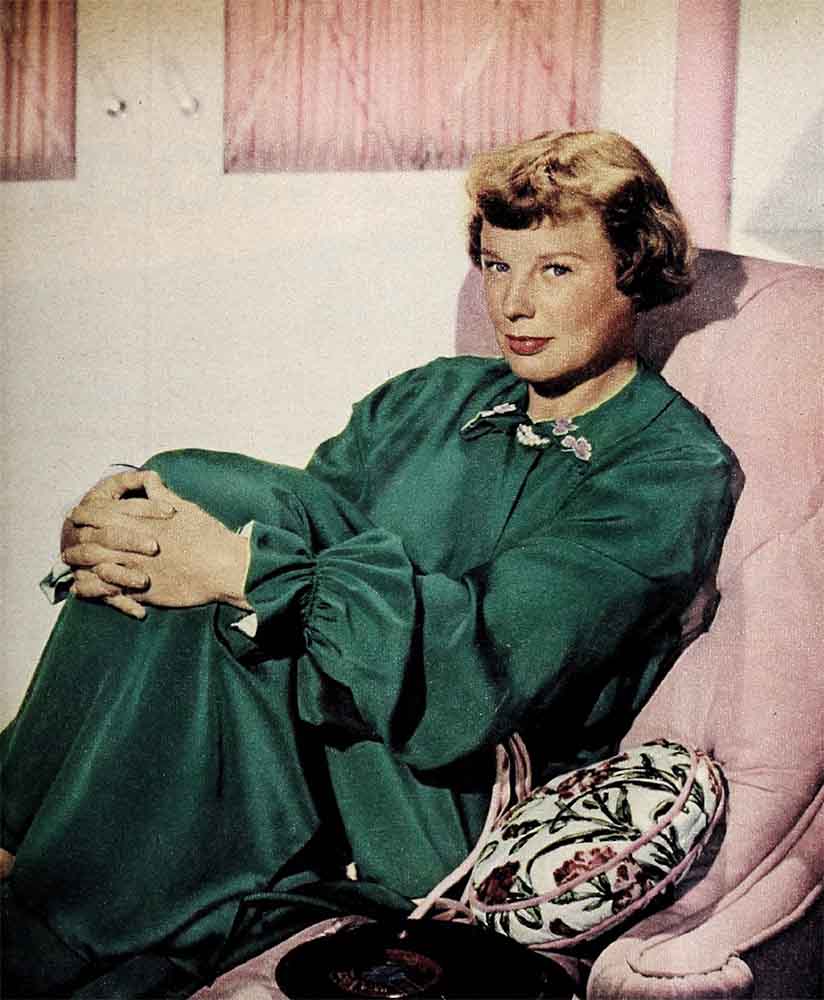
Kirk didn’t escape his youth, scot-free. Even today, rich, he will charge nothing. He always pays cash. He still isn’t easy about money and probably never will be. Also, following his separation from his former wife, he dated one Hollywood beauty after another. He acted pretty silly for a little while. He had to prove to himself again that he had made the grade.
Whatever Kirk does, however, he has the divine ability to stand off, watch himself and grin or groan over his activities with exactly the same perspective he would have about a friend. And even though he goes after what he wants, hell-bent for election, he doesn’t sit, brooding and bitter, if he doesn’t get it.
He wanted, desperately, to play Cyrano de Bergerac. Stanley Kramer was the producer. It was Stanley who made Kirk a star. But, by the same token, it was Kirk in “Champion” who made Stanley an important producer. Jose Ferrer played Cyrano. And when the picture premiered Kirk was there applauding the beautiful job of both the producer and the star.
Kirk has a personal magic that will see him through, no matter what.
Jeanne Crain has too. Once she sets her heart upon anything she acts, simply and calmly, as if it were an accomplished fact. I’m sure she believes it is.
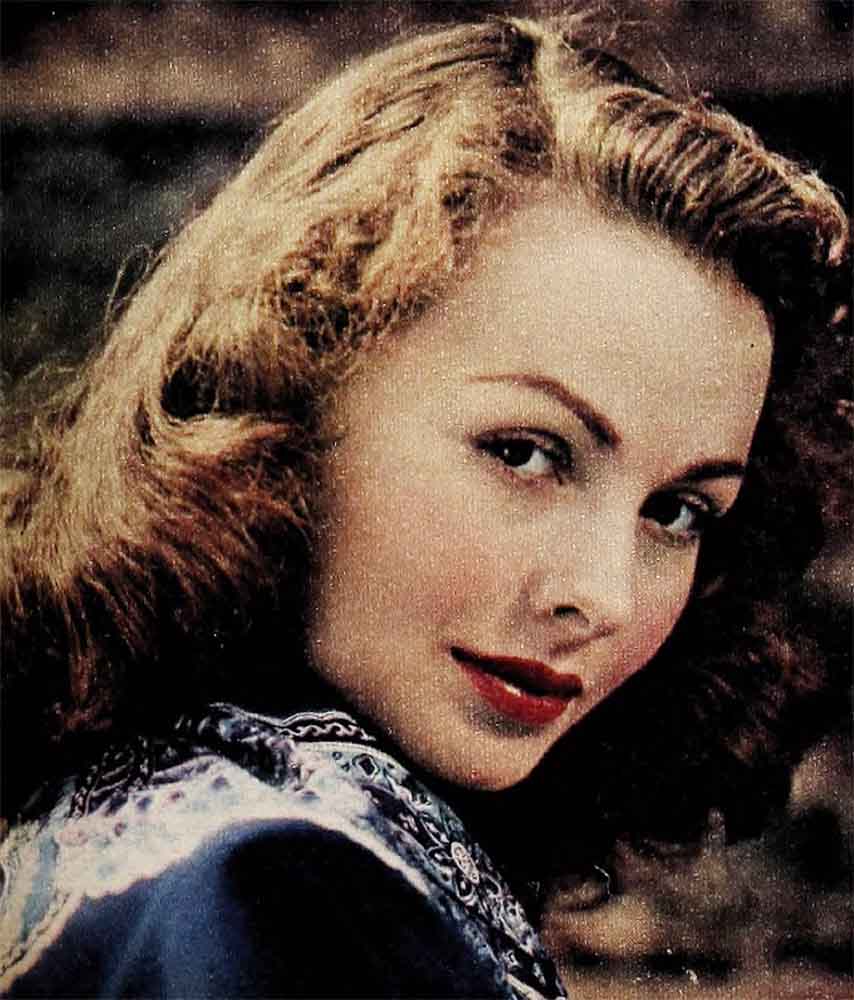
She set her heart upon Paul Brinkman and married him in spite of half a dozen other girls more beautiful and successful and assured. In spite of her mother’s disapproval too. Both her mother and her sister thought she was making a mistake to marry a man-about-town with acting ambitions. But Jeanne saw Paul settling down as a business man and a father of sons. And he has.
“Shall I have a baby? Maybe I’d better wait another year, until I’m better established . . .” These are the throes common to stars. But with Jeanne it’s simpler; she has a baby when she has a baby. If this costs her a good role, such a role as she lost to Susan Hayward in “I’d Climb the Highest Mountain” when she had her last son, well, she loses it. It never occurs to Jeanne to give up her personal life for her career or vice versa.
Several years ago a masculine star who was working with Jeanne noticed that she spent all her time in her portable dressing- room on the set. She changed there morning and night. She lunched there. “Don’t you have any other place to dress and rest?” he asked. “Yes, I do,” she said. “But you never use it?” he protested, curious. “No,” she said. “I’ve never stepped inside my regular dressing room and I never will until it is on star row.”
Jeanne’s dressing room then was in a building where lesser players park their belongings—so it undoubtedly had no place in the story of herself she had written in her mind. Now her dressing room is among the stars—and she uses it.
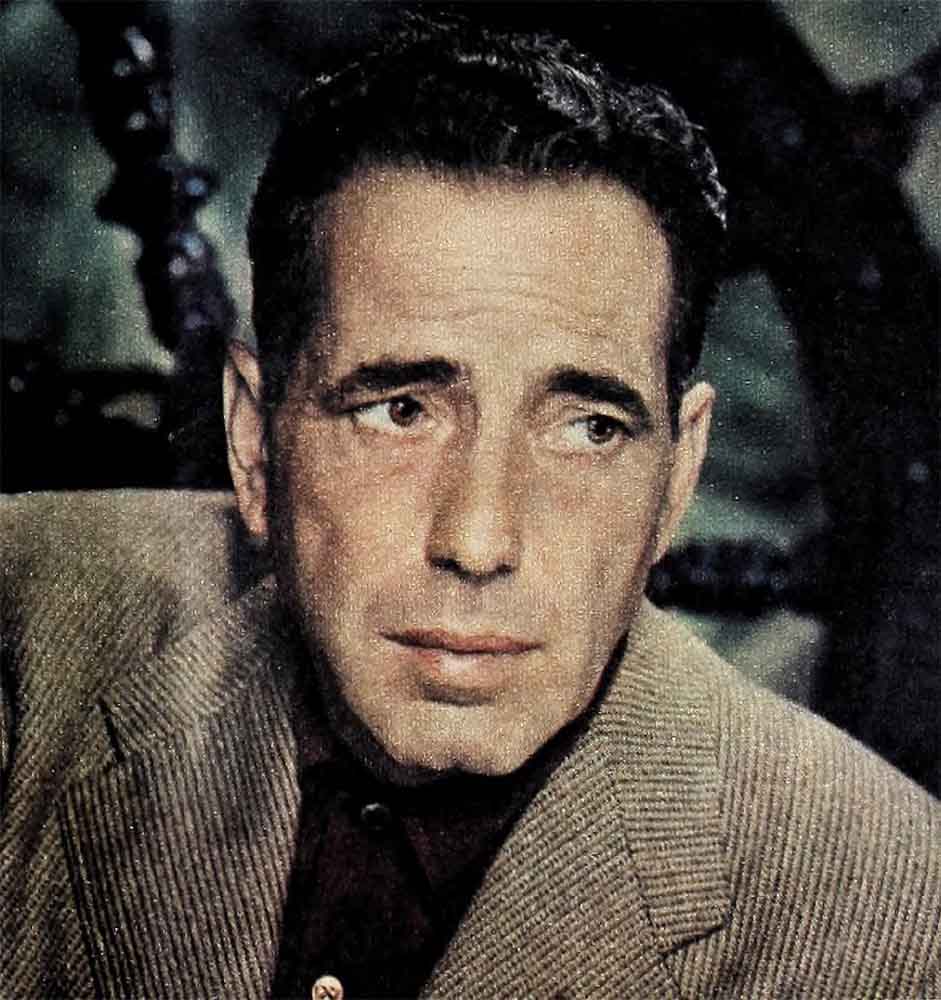
Few girls, I think, ever have such a quietly happy life as Jeanne. You would think that Gene Tierney, for instance, would have much more confidence and a much better time of it generally. But that isn’t so. Gene, a darling and my friend, is not sure of herself. She doesn’t know what he wants. She has never really found herself. Devoted as Gene is to her husband and her children I think she would be a little frantic if she spent as much time alone with her family on top of a mountain as Jeanne spends with hers. But this makes Jeanne, not Gene, the exception.
In all Hollywood there’s no more fearless actor than Humphrey Bogart. Actors are trained to be diplomatic, to say nothing and do nothing even remotely controversial. Usually this is a wise procedure.
But Bogart refuses to abide by it. An actor, he says, should not be muzzled. So if Bogart has anything to say he says it. And, time and time again, he gets away with the most outlandish things. Because it never occurs to him to worry as to what the reaction will be.
However, Bogie never attacks people who cannot easily protect themselves. He aims at the big shots instead. He’s basically kind. And this, I think, contributes in large measure to his personal magic.
His kindness is, I suspect, responsible for the happiness he knows today with Lauren Bacall. One ot his customary greetings to old friends on the lot is “Hiya, Creep.” He began his association with Lauren by ribbing her. But when he saw that, in spite of her smooth surface, she was painfully insecure, he quit. He was, in fact, the epitome of gentleness toward her until one day when he heard her greet a visitor to the set with “Hiya, Creep!” He shook his head. “Don’t try to be a character in too much of a hurry,” he warned realistically. For by this time he knew Lauren had gained enough confidence to take criticism. And, in love with her, he didn’t want her to outdistance herself. He’s direct and unafraid; probably was born that way. So he owns his career. It doesn’t own him.
The other evening the Screen Publicists gave their Panhandle Dinner. Jane Russell in a skintight gold mesh gown evoked long-drawn-out whistles.
“I know,” she laughed. “A press agent’s dream come true, this dress.”
She sang “Look What They’ve Done to Me” in which one of the lines proclaims they’ve put her in pictures her mother won’t let her see. And she put it over the way she always puts over a song—like nobody else. Because, besides having a voice and having learned how to use it. she has great zest and a marvellous sense of humor.
Now all of this isn’t exactly compatible with religion as we, unfortunately, think of it. Jane, however, is one of the most sincerely religious human beings I ever have known. Ask her anything about the Bible and she can name chapter and verse.
Recently she asked to pray with a formerly important producer who now is an alcoholic and out of a job. When Betty Hutton, separated from Ted Briskin, was wretchedly unhappy, she tried to help Betty too. “I think our Monday night meetings would be of some comfort to her,” she told a mutual friend. “They comfort me, I know. Usually there are twenty or thirty of us and we invite ministers from different denominations to address us.”
There is nothing dour about Jane’s religion. It’s such a vital, happy thing, as I’m sure God meant it to be. And because of it Jane, with her imperturbability to most things, is one of the happiest—and so most enchanted—people I have ever met anywhere.
June Allyson, Tony Curtis, Kirk Douglas, Jeanne Crain, Humphrey Bogart, Jane Russell—they all have such “life insurance” s cannot be bought . . . a quality or combination of qualities that makes them enchanted people indeed.
THE END
It is a quote. PHOTOPLAY MAGAZINE MARCH 1951




